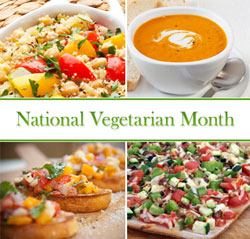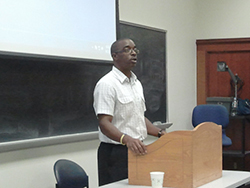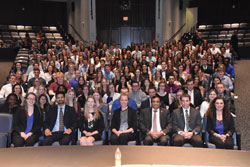October’s vegetarian awareness month is one of the initiatives that continue to increase the 7.3 million American’s interest in eating a plant-based diet. A study completed by the Vegetarian Times in 2012 found that 3.2 percent of American adults follow a vegetarian diet and 22.8 million follow a vegetarian-inclined diet.
By definition a vegetarian diet consists of mostly plant-based foods, without the conclusion of meat. Julie Schaaf, a professor of health and physical education describes vegetarianism as a “diet based on plant foods (fruits, vegetables, grains, legumes, beans, nuts and seeds).”
According to About.com there are actually six types of vegetarian diets. The pescatarian diet includes fish, the lacto-ovo (vegetarian) diet includes eggs and dairy, the flexitarian diet is flexible and includes meat on occasion, the vegan diet excludes eggs, dairy, fish and meat, the raw vegan diet involves foods that are cooked under 118 degrees and the macrobiotic diet is similar to raw vegan, although it is more lenient.
Vegetarian Awareness Month was originally created by the North American Vegetarian Society in 1977. The idea was created to allow people to share the benefits of a vegetarian diet and welcome others try excluding animals products from their diet.
Since the creation of the month, many have expressed an interest. “I love that there is a vegetarian month,” Mary Harris, Specialist Professor in Communication and Director of the Monmouth Area Vegetarian Society (MAVS) at the University said. “I believe it encourages more individuals and families to try a meatless Monday or to incorporate more plant foods into their meals.”
Since the increase in vegetarian among Americans, college students have also taken an interest. College website, Peta2.com reported that, “The number of vegan college students has more than doubled nationwide since 2005.
Rachel Kenny, a senior communication major, became a vegetarian at 12-years-old stated that she became a vegetarian because she was grossed out by the idea of meat. She explained that the decision was largely based on ethical and moral reasons and she is very satisfied with her decision. “Personally being a vegetarian has helped me be healthier because I’ve learned about a lot of other vegetables and healthy meal options,” added Kenny.
University students have also taken up an interest in vegetarian options. Edward Gomez, ARAMARK food director said, “Our chefs work to ensure that vegetarians feel that they have just as many well rounded meals as meat eaters do,” said Gomez. “They have definitely increased over the past 15 years as the vegetarian diet has become more popular.”
According to Gomez, there are a variety of vegetarian options available on campus. “We have options like vegetable burritos, veggie pizza, vegetable sandwiches, salads, vegetarian soup and a variety of vegetarian grab-and-go options to name a few,” said Gomez.
ARAMARK has made an effort to create a vegetarian option at each food station on campus, while also offering veggie burgers, tofu, salads, beans and super grains to students, Gomez added.
Schaad agrees that vegetarianism is on the rise also at the University. “I do find a few in my classes,” said Schaadd. “I think students are more open to the idea, but need some help on the implementation.”
There are many reasons that people choose to adopt vegetarian diets into their life and steer away from the American standard diet. Just a few of the more popular reasons for the diet are health factors, animal cruelty, environmental factors and even a desire to be different.
Christopher Hirschler, professor of Health and Physical Education said, “Vegetarian and vegan diets are becoming more popular because there is a growing recognition of the health benefits of plant-based diets and the problems associated with meat-based diets.”
Schaadd also states that health is a major concern, “The scientific evidence is mounting, both about the many health benefits of a vegetarian diet and the health risks associated with consuming large quantities of animal products.”
While consuming a vegetarian diet, an increased amount of vegetables and fruits are eaten, therefore allowing the body to absorb more nutrients, according to Schaad. “Plant products are full of vitamins, nutrients, phytochemicals and fiber. Eating a plant-focused diet is associated with lower risk of heart disease, cancer, obesity and diabetes.”
The common argument between non-vegetarians and vegetarians is that the vegetarian diet does not include enough vitamin D or protein and therefore, the diet is said to be unhealthy. Kenny who often finds herself in an argument about her diet choice said, “I’m constantly annoyed by claims that I don’t get enough nutrients.”
What many people do not realize is that vitamins do not have to be consumed through only animal products. There are many more types of food available that contain the same nutrients. “In fact, 100 calories of broccoli has twice as much protein as 100 calories of steak,” said Schaadd. “Also, think of some of the biggest animals out there, the gorilla, hippopotamus, giraffe, they’re all vegans.”
The reason behind the skepticism in vegetarian diets normally stems from incomplete information. “Many people are uninformed about plant-based diets, and this lack of knowledge combined with a fear of difference can cause someone to disregard or disparage a person who eats this way,” said Hirschler.
Andrew Bern, a senior communication major, who has never considered becoming a vegetarian said,
“Eating meat allows me to eat a well-balanced meal, therefore I won’t become a vegetarian in the future.”
Harris explained that the awareness of vegetarian diets, healthy eating, wellness, and ethical decision making at the University has also increased with the presence of MAVS.
Harris believes that adopting a healthier diet will allow people to learn about foods, health, the environment, and animals in ways that will strengthen their understanding of the world and allow them to make better conscious and ethical decision.
The MAVS organization holds three vegetarian potluck dinners a year on campus. Each dinner features a guest speaker that shares information about the beneficial impacts of living meat-free. “I most certainly believe that this organization is fulfilling its mission,” said Harris. “It has a positive impact on students and on our entire community.”
PHOTO TAKEN from ladylux.xom



